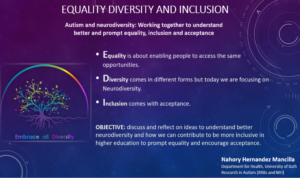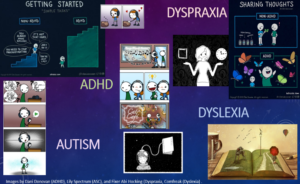A student blog as part of the Doctoral Exchange series organised by the Doctoral College.


As a neurodiverse person myself, I experience challenges every day even when just trying to go out. What may be a simple journey to university and finding a classroom for some, for me is a task that requires days and days of careful planning. Preparing plans A, B, C … all in case things happen unexpectedly. I can get lost in a small building and people not being patient when I ask for help makes things more challenging
This is just a simple example of how accessing support can be an overwhelming endeavour. Today we gathered, neurodiverse people and neurotypicals who support or are interested in supporting neurodiverse people, to talk about inclusion and equality in higher education (HE).
Some of the common themes we identified together to access support and prompt equality and inclusion were:
- Neurodiverse people need to trust you will provide support if they are going to share their diagnosis/challenges ‘Once you have said it, they don’t know how to handle it’, ‘They shut down’.
- People don’t understand the challenges and overlap amongst neurodevelopmental conditions. ‘Their ideas are dated or based on children’, ‘There are conditions they don’t know or confuse’.
- No support continuation from childhood to adulthood. ‘They need to assess you again’ ‘The information is there, [neurodiversity] does not go when you are an adult’, ‘It is not clear if the help [from an Education and health Care Plan] continues or not, or how’.
- Accessing support is challenging, finding forms, completing them, following the different steps, getting and sending multiple emails to get support is overwhelming. ‘Feels like a fight’, ‘It is set up against you’, ‘It is not a streamline process’.
Some ideas that may support equality accessing support and inclusion, considering both sides, those requiring support and those who are keen to provide it.
- Be able to share challenges (diagnosis) in a safe space. ‘Feel we can trust them’, ‘That they know what to do … how to support’.
- Explaining to the team how they can help. ‘A get together to explain things so we know how to support people’, ‘If we don’t know, we can’t help’.
- Student Services as the first port of call. ‘Talk to Student Services, who can signpost you to appropriate academic or mental health support’.
- Making the process neurodiverse-friendly. ‘Perhaps Student Services could make the processes to apply for support and DSA easier’, ‘Support each step of the way when applying for support … otherwise it is so overwhelming that [they] just leave it’.
Other ideas that we though could help:
- Peer support to guide and provide informal mentorship.
- Neurodiverse people can help training on different neurodevelopmental conditions.
Plan
1) We agreed that Nahory will create a Microsoft Teams group for this community. This will help us to share resources, provide peer support, moral and practical support and share ideas and opportunities.
2) If possible, we will meet using Teams, but we can communicate with each other there.
3) Nahory will contact two members individually for plans regarding training and peer support.
4) Nahory will communicate this information to Student Services and publish the blog on the University of Bath - Doctoral College page.
Note: We acknowledge there are many forms of diversity and we encourage acceptance and inclusion of all, many of us are multi-diverse, but today we focused on neurodiversity.
Acknowledgements
I would like to thank all those that attended and contacted me showing interest and willingness to support this endeavour.
A special thanks to Mark Searle, Rowena and Dr Max Buchanan as their ideas and encouragement motivated me to start this step and create the presentation.
‘Awareness is not enough, we need actions’
About Doctoral Exchange
This blog was written as part of the Doctoral Exchange series, a round-table discussion series for doctoral researchers to share experiences and ideas in a peer-to-peer environment. All topics are student-led. The programme can be found online on the Doctoral Exchange webpage. If you are interested in facilitating a session then please email doctoralengagement@bath.ac.uk.
Respond